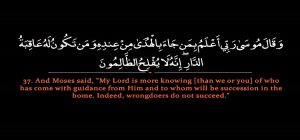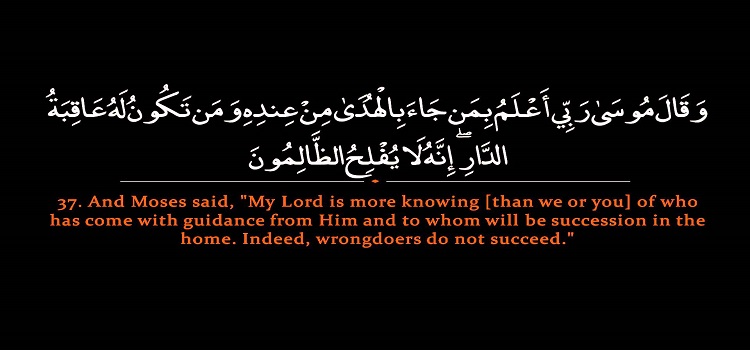The Way of Prophet Moses: His Method of Inviting to Allah (Part 1)
The ways which the Prophet Moses (Musa, peace be upon him) employed in calling people to the way of Allah were different from those of other prophets. They were different on three counts: the temper and position of the one who called, and the people to whom the message was addressed.
The task of conveying the truth, which was entrusted to Moses, was a bit different though it contained the basic and central elements of the invitation. That is: the ‘Way of Allah’; tawheed; belief in the Hereafter, Resurrection and life after death (in the Hereafter); the attributes of Allah; and invitation to believe in the unseen.
It was also different from another angle. Beside the basic and central subjects of discourse an additional responsibility was entrusted to him, it was to rescue Bani Isra’il (People of Israel) from the tyranny of Pharaoh and the miseries they were subjected to on account of their faith.
Different Mission
The Mission of the Prophet Moses was different. The unusual circumstances in which Moses was born and brought up and the difficult conditions he was confronted with are factors which go to make his mission different from those of other prophets.
He was also entrusted with the task of telling Pharaoh in plain terms that he was a tyrant and despot, and that he was oppressing Bani Isra’il. Bani Isra’il were the descendants of prophets and their ancestors had been true believers in Allah and in tawheed (Oneness of Allah).
It was not a matter of any particular nation or group because such groups have always existed in the world and they can still be found.
Had it been the matter of a group or clan whom a tyrant had enslaved and was oppressing and who were suffering on account of their beliefs, then it would have been of no special significance. This has happened at all times and we can find many such examples in every period of history.
It is also not beyond our imagination that such groups of people will exist in the future also.
The Different Position of Bani Isra’il
In spite of their laxity in observation of religious duties, lack of morality and certain other weaknesses, Bani Isra’il was a community which was then a custodian of tawheed.
History provides evidence that in spite of their weaknesses, they had retained their belief in Allah. This was a time when few people knew anything about tawheed.
The exegetes of the Qur’an have mentioned that this was the only reason for their superiority over other communities.
They had kept the torch of tawheed alight in the prevailing darkness of polytheism and idol-worship.
It was not just that Bani Isra’il were subjected to iniquities at the hands of Pharaoh and were living at the mercy of a tyrant and autocrat; they were also custodians of tawheed and trustees of the legacy of prophethood. They were at that time bearers of that trust which was the sum total of the teachings of earlier prophets.
Dual Responsibility of the Prophet Moses
There was a specific difference between the Prophet Moses (peace be upon him) and other prophets because he had a dual responsibility: to carry the message of truth and invite the attention of Pharaoh towards Allah – the One, the Almighty and tell him that He has no partner in sovereignty and is the only Law-Giver; and to liberate Bani Isra’il from their serfdom.
So go to him and say: ‘Truly we are two messenger of your Lord. So let the Children of Isra’il go with us, and torment them not. We bring you a token from your Lord. And peace will be for him who follows right guidance.’ (Ta-Ha 20:47)
This is the aspect of the mission of the Prophet Moses (peace be upon him) which differentiates him from others.
But his position was delicate, as his life and the trials and tribulations through which he had to pass were different from those of other prophets.
The Planning of Pharaoh
Moses (peace be upon him) was born in very difficult and insufferable circumstances. Pharaoh had directed his agents or police not to leave any newborn Isra’ilite ba alive:
Truly, Pharaoh exalted himself in the land and made its people castes. A tribe among them he oppressed, killing their sons and sparing their women. Lo! he was of those who work corruption. (Al-Qasas 28:4)
Pharaoh had devised his plan with great care – the way so-called advanced countries formulate their plans today.
It was that no Israelite male child should be left alive. If a generation of male children were done away with in this manner, there would be no fear (of an uprising) from Bani Isra’il as women folk would alone be left alive and no harm would come from them. ”The male child shall be killed and the female child left alone.”
Like an autocrat, he issued this directive against which there was no appeal. But the will of Allah was that a great person should be born among the Israelites. Pharaoh wanted to get rid of the Israelites not allowing any male child to remain alive who could destroy his kingdom.
But Omnipotent Allah caused all his plans to come to nothing. Allah allowed Moses to live. Although it was for his sake that innocent children were being killed Pharaoh the ba, of which Pharaoh was afraid, was born and grew up. How he was saved and brought up is one of the wonders of human history. It is a miracle of the power of Allah that he was reared in the lap of his sworn enemy- Pharaoh.
The Supernatural Environment
Keep in your mind’s eye the circumstances prevailing at the time, of which each and every aspect is an evidence of the working of the super-natural power of Allah – a fact evident from beginning to end.
And the family of Pharaoh took him up, that he might become for them an enemy and a sorrow.
Truly, Pharaoh and Haman and their hosts were ever wrongdoing. And the wife of Pharaoh said: ‘(He will be) a consolation for me and for you. Don’t kill him. Perhaps he may be of benefit to us, or we may choose him for a son’, and they did not perceive. And the heart of the Moses’ mother became void, and she would have betrayed hi.m if We had not comforted her heart, that she might be of the believers. And she said to his sister: ‘Trace him,’ so she observed him from afar, and they did not perceive.
And We had beforehand forbidden foster-mothers for him, so she said: ‘Shall I show you a household who will rear him for you and take care of him.’ So We restored him to his mother that she might be comforted and not grieve, and that she might know that the promise of Allah is true. But most of them know not. (Al-Qasas 28:8-13)
Prophet Moses (peace be upon him) having been brought up in the palace of Pharaoh left it stealthily after accidentally killing a member of Pharaoh’s people.
And he entered the city at a time of carelessness of its folk, and he found therein two men fighting, one of his own caste and the other of his enemies; and he who was of his caste asked him for help against him who was of his enemies. So Moses struck him with his fist and killed him. He said: ‘This is of Shaytan’s doing. Truly, he is an enemy, a clear misleader.’ (Al-Qasas 28:15)
It was a clear miracle and the most bright and shining example of the signs of Allah that a person was chosen for conveying the truth and for the liberation of Bani Isra’il whose position amongst them had been rendered most precarious.
To be continued……
_________________________
The article is excerpted from the book “Inviting to the Way of Allah”, Sayyed Abul Hasan Ali Nadwi, Translated Qazi Abdul Hamid, published Ta-Ha Publishers Ltd. and UK Islamic Academy, 1996/1416 H.
[ica_orginalurl]

